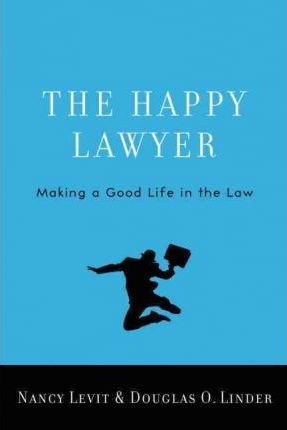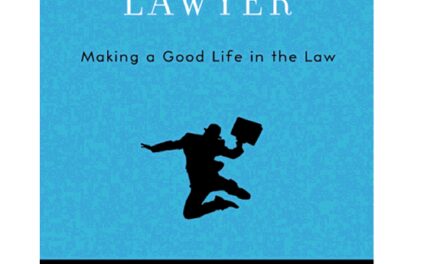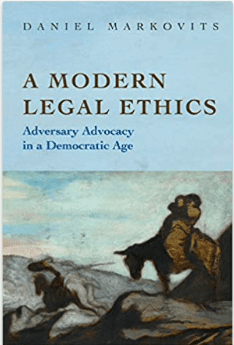LAWYER UNHAPPINESS
Part IIIE-IV
Another General but Mostly Independent Approach & Some Recommendations
Our Authors suggest one more general approach to the acquisition or the increase of happiness, which may be close to the same thing, and the maintenance of increases or what has been acquired. What they have done is to formulate a series of general and widely accepted observations, that are difficult to reject, at least at first. Some of them are reversals of the states of affairs that will lead to unhappiness. Speaking of reversals of general conditions of unhappiness being part of the “toolbox” for happiness, some of the principles I attribute to them are really my constructions of what I think they said without saying it.
Remember Our Authors “jump” in two directions; (1) states of affairs that make lawyers unhappy, and (2) states of affairs that lead to unhappiness for many people whether lawyers or not. We say this in III D.
In other words, they treat the principles they posit first as a matter of fact–as in “All people need this: _______. They really do.” They then argue that each of them is one key to happiness; although they do not really push the point, it is obvious that all of these principles should be at least partially understood, thought more about, attempted to apply, and reflect upon what happened when the attempts do or do not work. People trying this method should also learn to be charitable to themselves as they try to go forward. They must remember that mistakes, plus reflections on them, are productive. Unlike the Seligman system, it looks like those working on happiness enhancement can use them all, though (perhaps) not all of them at the same time. Our Authors also say clearly that what they are providing is not a “recipe.” They say, or would say, that they are providing a “toolbox.” (Actually, they have presented “tools” for a “toolbox.” What matters is not the box, but what’s in the box. It doesn’t even have to be a box. It could be a raggedy sack.)
Our Authors seem to imply clearly, that applying some of them may bring joy, at least some of the time. All of this is wisdom, to come extent. Our Authors give their treatment of these matters with the chapter title, “The Happiness Toolbox.” The idea of a “toolbox” can be confusing. One wants to wonder if this excellent and revealing book should not have been entitled The Happier Lawyer.
1. The happy lawyer needs a considerable sense of controlling his/her own life.
A lack of control will lead to depression in lawyers, along with most everyone else. (I will return to the topic of depression later.)
People should become attuned to, look after and balance their lives emotional lives. This includes lawyers; as one might expect.
Lawyers should seek security in their jobs.
Happiness requires that one feel as though they are making a genuine contribution to something significant. The addiction to “workaholicism” is to be avoided by or crushed inside of every lawyer who suffers from it. It won’t go gently, even in the middle of the night, long after all the work is finished. [Are there not some people for whom workaholism is a good state of affairs? Might there not even be an “intimate other” who is glad that some lawyer–or anyone else? Could such a satisfaction ever be OK?]
Lawyers should seek flexibility in their lives.
2. Learn to remember that in virtually every circumstance, things could be worse.
Empirical data: Those who finish second are often happier than those who finish first. Worse for you. “True. I am about to go bankrupt, but I’m not going to jail.” “True. I am losing my family, but I can stay in touch with the kids quite often, as they’ll just be across town. Even though she’s divorcing me, she’s made me miserable for years. I’ve stuck with her only because. . . .”
And for fourth. Worse for someone else, in comparison to you. “She’s in worse shape than I am, by far. At least my husband and I split into good terms.”
Worse for someone else, looked at in terms of his life only. “My God. Things have not gone well for her. So much money. Such a big house. So many friends but her five children are all completely worthless, as she has told me many times recently when she has been drunk. I don’t know how to think about it. And after the life of a fully devoted Christian.”
Money doesn’t bring happiness if it goes above what is “enough.”
Determine what is really enough.
Our Authors are more or less helpful about this very difficult idea, and that’s all that can be expected.
—MSQ
Defining or determining what is enough economic and financial concerns
Determining what is really enough is very difficult. It involves all sorts of struggles: with one’s conception of his or her self
with one’s own history expectations projections and ideas hatred of downward of mobility (sometimes) now for a really hard one: dealing with the expectations of others, particularly spouses and children plus lots more.
The old phrase “Enough is enough” sounds like a tautology, but it still requires figuring out what the first word—” Enough”–is about, not to mention the third one.
At the same time, do not look for unhappiness in others. If you think you see it without working at it, the unhappiness is probably there. However, don’t try to find it. Many lawyers try to hide their unhappiness. This is true about other sophisticated as well. It will slip out. Don’t try to find it. Put suspicions to real meaningful work.
There are signals of unhappiness. Too many marriages without a change in behavior and presentation of self. A whole succession of “companions,” whether married or not. And lots more.
What are the usual terms for this? Optimism? Bad things: are within the will of an omniscient and benevolent God
probably will not happen can’t happen here, to you (or us, of me), now Don’t worry about that one, unless it is a large fraction of life. “things have a way of working out”? “accentuate the positive”? “turning things over”? “turning things over to God” (Christian and Jew)?
3. Satisfying relationships–“social connectedness”–with other people are a key to happiness.
Commitment is crucial. Remember, a law firm may provide some of this. Remember, no job is perfect.
4. Loving relationship(s) is crucial for happiness.
[Impliedly Our Authors but made more explicit by me.]According to Our Authors, empirical data at least suggests that “70% of our controllable happiness stems from relationships.” Citation (p. 90 n.16): Eric Weiner, THE GEOGRAPHY OF BLISS 251 (2008). [Is being blissful necessarily connected to happiness? As a necessary condition? As a sufficient condition? Or as an equivalence? Of course, the answer to these questions depends on the nature of bliss and the nature of happiness.]
5. Find your “flow.”
Action and awareness of worth and meaning merge together. Doing what? Almost anything. Golfing, gardening, gold searching, cooking, trying to write a murder mystery, trying to run marathons, playing puzzles and the list goes on. Look for the flow, and read books by Mihaly Csikszentmihalyi. He might reject the list I just made up for Our Authors since he seems to suggest activities not to emphasize skill. How would chess, or even checkers or ping pong, figure in?
How would virtual games figure in?
I will come back to “flow’ in a later “essay.” He is a key figure in some methods of obtaining and keeping happiness.
6. Learn from the Happiness (or Unhappiness) of Others.
Unhappiness: Do not go looking for unhappiness in others. It will be obvious, or it will (in effect) come looking for you.
I suggest, as will Our Authors, looking for happiness in those who present themselves as happy, and there is good reason to think that their self-presentation is true.
Different kinds of manifestations of unhappiness do not need to hear about by a person that is already unhappy. S/he knows what s/he needs to know about his/herself. The unhappy person does not need to compare and contrast one unhappiness with another..
Q.”Why are you unhappy?” I’ve noticed that you are, I think.
A. “I’m not unhappy. Where would you get that idea?”
Q. Id.
A. “Go fuck yourself.”
Q. Id.
A. “I’ve been waiting to tell someone this. Too much booze, too much coke, too much bar bathroom sex with “partners,” failing at Twelve Step meetings too many times, waking up in alleys and not remembering how I got there. Should I go on?”
Did you really need to hear all that? Did it do you any good?
What would your life have been like if you had not heard it?
Happiness: Are you? What its like, when you have it? Where does it come from in your case?
Where did you start? How? When? Have you ever talked to others about those sorts of things? What do they say?
Do you have to work to keep it now, or is it embedded?
Now what about this one, “‘You can’t be envious and happy at the same time.'” (Citation: Sonja Lyubomirsky, THE HOW OF HAPPINESS: A NEW APPROACH TO GETTING THE LIFE YOU WANT (2007) p. 88 n. 16
Complete nonsense:
X envies the musical genius of Bach, and he “produced” procreating 20 children.
Y envies Tiger’s golf talent, though not his dealing with women.
Z envies the political insights and speaking talents of Rush Limbaugh, though not his clothing or weight.
Z envies the beauty and appearance of dress, of a given woman but not her ill-informed politics.
7. Know Yourself.
This principle could be an axiom, except that it is so hard. It takes years and years to achieve the goal. The only sensible thesis here is this: Working on coming to know yourself is in and of itself, a source of happiness. There are real problems in this profound inquiry: You may not like the person you encounter along the way.
The person you meet along the way may not be lovable. If so, then what do you do? Stop the process? Keep going and change your mind about yourself? Keep going and accept yourself for who you are?
One shared assumption of a great many philosophies and theologies along with some political theories is that, at the core, the overwhelming majority of all people are really good and decent. I believe that proposition is false. Still, I have never personally met a person who was unhappy being a lawyer, that I believed was profound, to-the-core, evil. The same is true for practicing lawyers. Perhaps I am cynical, optimistic, and realistic all at the same time. This idea would make John Venn (1834-1923) turn over in his relatively recent, as these things so, grave.
By the way, the words of the phrase were originally popularized, maybe invented, by Socrates. Shakespeare advocated something like a consequence of it: “To thine own self be true, and it shall follow. . . .” Of course, I have rejected this view in this very discussion.
8. Make sure your job and your values are congruent.
9. Not all happy-nesses are “created” equal.
I’m not sure what all this might mean. Probably several things, in the alternative or all at once. The pattern might be this: If you are aiming at happiness and there are two routes in front of you, one may work better than the other. Or, one situation may make you happier than another, although they will both make you happier than you are now, and it is unknown and unknowable, in advance which one is further up the scale. There are two ways to live your life and they will both make you happy (surfing and dog walking), and you have to choose one. How do you choose? Or maybe the idea is that, which situation will make you happier can be known if you think about it rigorously and/or in the right sort of way. And there is much more, but not everything can be written up. Some might think that this series of blog essays are already too long. Nevertheless, I will add one more chapter, and that one is just a sketch of some of my own views. Some of them have already been set forth in these chapters.






Recent Comments